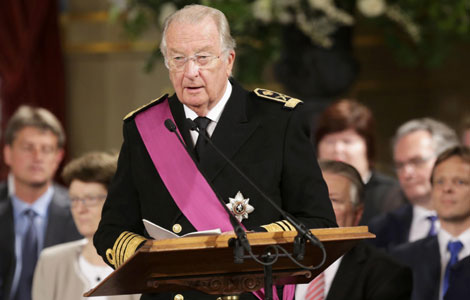Eradicating poverty still important
Updated: 2013-07-22 08:23
By Makul Sanwal (China Daily)
|
|||||||||
The sustainable development goals, now being negotiated for the post-2015 global agenda, which will be more transformative than the previous period, will define national trajectories for sustainable development and shape multilateral relations for the next 30 years.
The climate treaty, negotiated in Rio in 1992, is an experiment in bringing together development and environment to reconcile a continually growing global economy within a finite global ecosystem. However, international environmental law has not been able to resolve how to accommodate the rising living standards of all those who have so far been excluded from the benefits of globalization.
But after last year's Rio summit, environment and development are coming together around global sustainable development goals to shape the patterns, trends and drivers of global change. The new rules for the post-2020 climate regime are also now focusing on aggregate emissions pathways rather than percentage reductions in emissions of greenhouse gases.
Responding to the geopolitical shifts in a multi-polar world, the G8 now recognize climate change and sustainable development as "mutually reinforcing", while also describing climate change as a security threat. But China and India have not yet formulated a comprehensive response to these three parallel negotiations in the Climate Convention, General Assembly and the Security Council that will take place between now and 2015.
As the Millennium Development Goals' 15-year deadline to eradicate poverty will miss the targets that were set in 2000, it is appropriate to review the reasons, because eradicating poverty has been central to the agenda of the UN since it was established in 1948. The reason is that development cooperation has focused on humanitarian and political concerns rather than the social and economic concerns of those who have been left out of the process of globalization. The MDGs also stressed meeting basic human needs and ignored other preconditions for sustainable development, for example, adequate and affordable energy as a basic human right. They also framed development cooperation narrowly as essentially an aid-driven relationship and ignored other policy instruments such as trade, investment and technology transfer.
The reduction in poverty in recent decades has been overwhelmingly dependent on the rapid growth of China, which did not adopt a MDG-focused policy but did in its own way. China alone accounts for three-fourths of the global reduction in poverty. A review of past trends suggests that two-thirds of poverty reduction depends on growth and one-third on equality, because poverty will be eradicated only when all have assured access to affordable services, such as energy, food, housing, transport, education, health and employment. However, in the context of ecological limits, it is worth noting that the billion richest also account for 72 percent of world consumption with the poorest billion accounting for only 1 percent of natural resource use. A global consensus is needed to define a standard of living that ensures exercise of universal rights and economic opportunities, otherwise we will fool ourselves into thinking, once again, that poverty is history.
The author is a former advisor to the United Nations Environment Program.
(China Daily 07/22/2013 page8)
Most Viewed
Editor's Picks

|

|

|

|

|

|
Today's Top News
Guangdong to probe airport bomber's allegations
6.6-magnitude quake hits NW China
Police meets GSK representative after scandal
US protests demand 'justice for Trayvon'
Minister rules out stimulus package
Top Chinese admiral to visit US this year
Victory improves Abe's hand
Yuan influence on the rise worldwide
US Weekly

|

|















